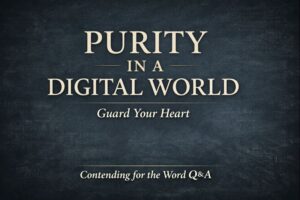⏱️ Estimated Reading Time: 4 min read
Christian Deconstruction Is Rebellion, Not Renewal
By Dave Jenkins
In recent years, a growing number of people have begun to “deconstruct” their Christian faith. From Instagram influencers to former pastors and musicians, the term Christian deconstruction is now used to describe a process of rethinking, dismantling, or abandoning long-held theological beliefs.
But what does this movement actually represent—and how should faithful Christians respond?
1. The Bible Warns Against Abandoning the Faith
“Now the Spirit expressly says that in later times some will depart from the faith…” — 1 Timothy 4:1
“Take care, brothers, lest there be in any of you an evil, unbelieving heart, leading you to fall away from the living God.” — Hebrews 3:12
“They will turn away from listening to the truth and wander off into myths.” — 2 Timothy 4:3–4
Asking honest questions isn’t sinful. But when those questions lead to the rejection of biblical authority, doctrinal truth, and the gospel itself, we are not seeing growth—we’re seeing spiritual rebellion.
2. The Problem with Modern Christian Deconstruction
While some describe faith deconstruction as a healthy reevaluation, the reality is that modern deconstruction often involves:
- Rejecting the authority of Scripture in favor of personal experience
- Redefining sin, salvation, and truth to align with cultural values
- Following popular voices who encourage doubt without grounding in biblical truth
In many cases, those who embrace deconstruction ultimately deny essential Christian doctrines: the inerrancy of Scripture, the exclusivity of Christ, the necessity of repentance, and biblical morality.
This is not spiritual maturity—it’s a spiritual drift toward apostasy.
3. Doubt Is Not the Enemy—But Deconstruction Is Not the Answer
Doubt is part of the Christian journey. The Bible gives us many examples of faithful saints who wrestled deeply:
- Martin Luther faced spiritual despair but clung to God’s promises in Scripture.
- Charles Spurgeon battled depression but remained rooted in the gospel.
- Augustine struggled with sin and identity but submitted to the truth of God’s Word.
Throughout history, faithful believers have pressed into God’s Word—not away from it. Christian deconstruction, as practiced today, often does the opposite.
4. A Biblical Response to Doubt
Instead of dismantling our faith, Scripture gives us a path forward when doubts arise:
- Ask honest questions — Psalm 13; Mark 9:24 — but with a heart that seeks God.
- Renew your mind — Romans 12:2 — through the Word, not the world.
- Be built up in the faith — Jude 20–21 — by sound doctrine and prayer.
- Test everything by Scripture — Acts 17:11 — not social trends or personalities.
Deconstruction offers a foundationless freedom. The Bible offers living truth.
5. Deconstruction or Disobedience?
Jesus never invited us to redefine the faith. He called us to die to ourselves and follow Him.
“If anyone would come after me, let him deny himself and take up his cross daily and follow me.” — Luke 9:23
True discipleship is not about tearing down the truth. It’s about building your life on it.
6. A Pastoral Call to Return to the Word
If you’re wrestling with doubts, don’t walk away from the Church. Don’t abandon the Bible. Run to Christ.
- Ask your questions
- Open your Bible
- Seek godly counsel
- Pray honestly
God is not afraid of your doubts—but He won’t bless rebellion. He calls you to build your life on the Rock, not tear down the house of faith.
“He who doubts must not remain in the valley of shadow. Let him climb the hill of Calvary and behold the cross.” — Charles Spurgeon
📚 For Further Study
- Scripture Alone by James White
- The Word Matters by Dave Jenkins
- The Poison of Progressive Christianity an issue of Theology for Life on theological liberalism.
- ACBC’s Find a Counselor tool for biblical counseling support
Dave Jenkins is happily married to his wife, Sarah. He is a writer, editor, and speaker living in beautiful Southern Oregon. Dave is a lover of Christ, His people, the Church, and sound theology. He serves as the Executive Director of Servants of Grace Ministries, the Executive Editor of Theology for Life Magazine, the Host and Producer of Equipping You in Grace Podcast, and is a contributor to and producer of Contending for the Word. He is the author of The Word Explored: The Problem of Biblical Illiteracy and What To Do About It (House to House, 2021), The Word Matters: Defending Biblical Authority Against the Spirit of the Age (G3 Press, 2022), and Contentment: The Journey of a Lifetime (Theology for Life, 2024). You can find him on Facebook, Twitter, Instagram, Youtube, or read his newsletter. Dave loves to spend time with his wife, going to movies, eating at a nice restaurant, or going out for a round of golf with a good friend. He is also a voracious reader, in particular of Reformed theology, and the Puritans. You will often find him when he’s not busy with ministry reading a pile of the latest books from a wide variety of Christian publishers. Dave received his M.A.R. and M.Div through Liberty Baptist Theological Seminary.




